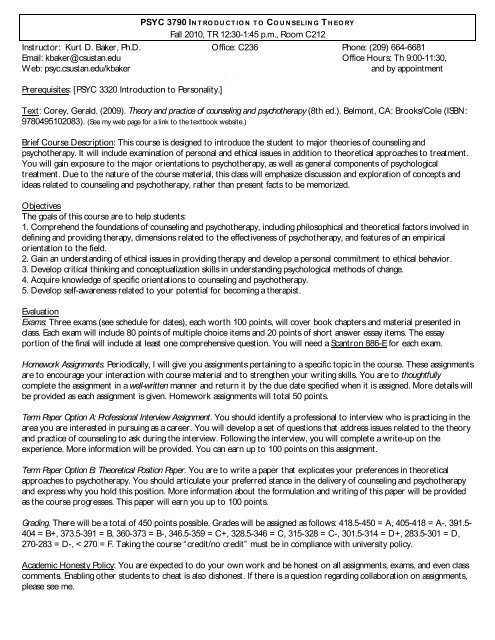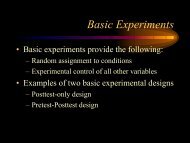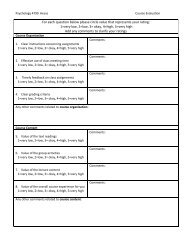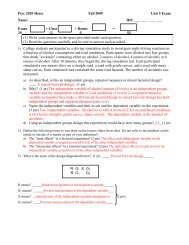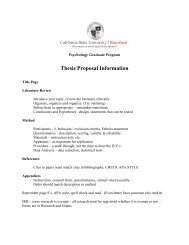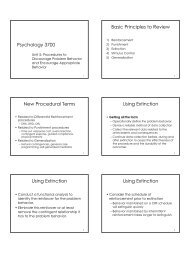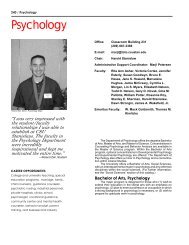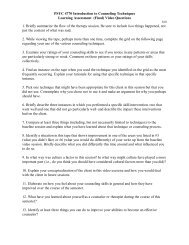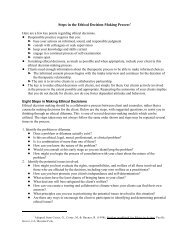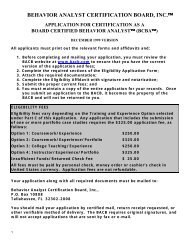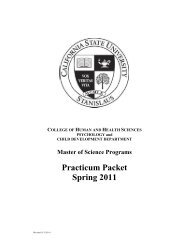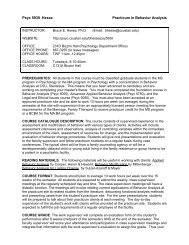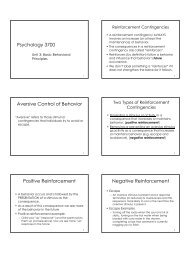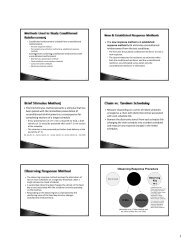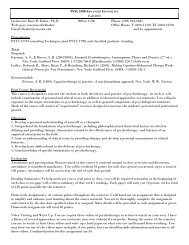PSYC 3790 I Fall 2010, TR 12:30-1:45 p.m., Room C212 Instructor ...
PSYC 3790 I Fall 2010, TR 12:30-1:45 p.m., Room C212 Instructor ...
PSYC 3790 I Fall 2010, TR 12:30-1:45 p.m., Room C212 Instructor ...
Create successful ePaper yourself
Turn your PDF publications into a flip-book with our unique Google optimized e-Paper software.
<strong>PSYC</strong> <strong>3790</strong> IN<strong>TR</strong>ODUCTION TO COUNSELING THEORY<br />
<strong>Fall</strong> <strong>2010</strong>, <strong>TR</strong> <strong>12</strong>:<strong>30</strong>-1:<strong>45</strong> p.m., <strong>Room</strong> C2<strong>12</strong><br />
<strong>Instructor</strong>: Kurt D. Baker, Ph.D. Office: C236 Phone: (209) 664-6681<br />
Email: kbaker@csustan.edu Office Hours: Th 9:00-11:<strong>30</strong>,<br />
W eb: psyc.csustan.edu/kbaker and by appointment<br />
Prerequisites: [<strong>PSYC</strong> 3320 Introduction to Personality.]<br />
Text: Corey, Gerald. (2009). Theory and practice of counseling and psychotherapy (8th ed.). Belmont, CA: Brooks/Cole (ISBN:<br />
9780495102083). (See my web page for a link to the textbook website.)<br />
Brief Course Description: This course is designed to introduce the student to major theories of counseling and<br />
psychotherapy. It will include examination of personal and ethical issues in addition to theoretical approaches to treatment.<br />
You will gain exposure to the major orientations to psychotherapy, as well as general components of psychological<br />
treatment. Due to the nature of the course material, this class will emphasize discussion and exploration of concepts and<br />
ideas related to counseling and psychotherapy, rather than present facts to be memorized.<br />
Objectives<br />
The goals of this course are to help students:<br />
1. Comprehend the foundations of counseling and psychotherapy, including philosophical and theoretical factors involved in<br />
defining and providing therapy, dimensions related to the effectiveness of psychotherapy, and features of an empirical<br />
orientation to the field.<br />
2. Gain an understanding of ethical issues in providing therapy and develop a personal commitment to ethical behavior.<br />
3. Develop critical thinking and conceptualization skills in understanding psychological methods of change.<br />
4. Acquire knowledge of specific orientations to counseling and psychotherapy.<br />
5. Develop self-awareness related to your potential for becoming a therapist.<br />
Evaluation<br />
Exams: Three exams (see schedule for dates), each worth 100 points, will cover book chapters and material presented in<br />
class. Each exam will include 80 points of multiple choice items and 20 points of short answer essay items. The essay<br />
portion of the final will include at least one comprehensive question. You will need a Scantron 886-E for each exam.<br />
Homework Assignments. Periodically, I will give you assignments pertaining to a specific topic in the course. These assignments<br />
are to encourage your interaction with course material and to strengthen your writing skills. You are to thoughtfully<br />
complete the assignment in a well-written manner and return it by the due date specified when it is assigned. More details will<br />
be provided as each assignment is given. Homework assignments will total 50 points.<br />
Term Paper Option A: Professional Interview Assignment. You should identify a professional to interview who is practicing in the<br />
area you are interested in pursuing as a career. You will develop a set of questions that address issues related to the theory<br />
and practice of counseling to ask during the interview. Following the interview, you will complete a write-up on the<br />
experience. More information will be provided. You can earn up to 100 points on this assignment.<br />
Term Paper Option B: Theoretical Position Paper. You are to write a paper that explicates your preferences in theoretical<br />
approaches to psychotherapy. You should articulate your preferred stance in the delivery of counseling and psychotherapy<br />
and express why you hold this position. More information about the formulation and writing of this paper will be provided<br />
as the course progresses. This paper will earn you up to 100 points.<br />
Grading. There will be a total of <strong>45</strong>0 points possible. Grades will be assigned as follows: 418.5-<strong>45</strong>0 = A, 405-418 = A-, 391.5-<br />
404 = B+, 373.5-391 = B, 360-373 = B-, 346.5-359 = C+, 328.5-346 = C, 315-328 = C-, <strong>30</strong>1.5-314 = D+, 283.5-<strong>30</strong>1 = D,<br />
270-283 = D-, < 270 = F. Taking the course “credit/no credit” must be in compliance with university policy.<br />
Academic Honesty Policy: You are expected to do your own work and be honest on all assignments, exams, and even class<br />
comments. Enabling other students to cheat is also dishonest. If there is a question regarding collaboration on assignments,<br />
please see me.
Additional Information<br />
Although you are not required to attend, you are expected to do so. Class discussion and participation are important.<br />
Consistent attendance and participation will improve your grade if you are close to the cutoff. You will be responsible for all<br />
information and material presented in class, such as lecture and discussion material, announcements regarding scheduling<br />
changes, etc. Please arrive to class on time and avoid leaving early.<br />
No exams may be made up or taken early, except in extenuating circumstances backed up by acceptable documentation. If<br />
you do encounter extenuating circumstances, you must contact me immediately to notify me of your situation. Failure to do<br />
so will result in the lost opportunity for make up. Assignments are due at the beginning of class. Late assignments will lose<br />
points at a rate of 10% per day. A limited number of extra credit points may be earned. If you become interested in extra<br />
credit, see me.<br />
<strong>2010</strong> Tentative Class Schedule<br />
W eek Date Topic Readings<br />
1 8 /24/10 Introduction to Class [& crisis intervention] --<br />
8/26/10 Introduction to Counseling and Psychotherapy 1<br />
2 8/31/10 Counseling & Psychotherapy Additional Reading<br />
9/2/10 Therapist: Person and Professional 2<br />
3 9/7/10 “ “<br />
9/9/10 Ethics 3<br />
4 9/14/10 “ “<br />
9/16/10 Psychoanalytic Therapy 4<br />
5 9/21/10 “ “<br />
9/23/10 Existential Therapy 6<br />
6 9/28/10 “<br />
9/<strong>30</strong>/10 Exam 1 1, 2, 3, 4, 6, Add’l Reading<br />
7 10/5/10 Person Centered Therapy 7<br />
10/7/10 “ “<br />
8 10/<strong>12</strong>/10 Gestalt Therapy 8<br />
10/14/10 “<br />
9 10/19/10 Cognitive Therapy 10<br />
10/21/10 “ “<br />
10 10/26/10 Reality Therapy 11<br />
10/28/10 “ “<br />
11 11/2/10 Exam 2 7, 8, 10, 11<br />
11/4/10 Feminist Therapy <strong>12</strong><br />
<strong>12</strong> 11/9/10 “ “<br />
11/11/10 Veterans Day - NO CLASS –<br />
13 11/16/10 Postmodern Approaches 13<br />
11/18/10 — Class Canceled —<br />
14 11/23/10 Postmodern Approaches (cont) “<br />
11/25/10 Thanksgiving Break - NO CLASS –<br />
15 11/<strong>30</strong>/10 Family Systems Therapy 14<br />
<strong>12</strong>/2/10 “ “<br />
16 <strong>12</strong>/7/10 Psychotherapy Integration & Effectiveness 15<br />
<strong>12</strong>/9/10 “ Additional Reading<br />
--- <strong>12</strong>/16/10 Final Exam 11:15 a.m. to 1:15 p.m. <strong>12</strong>-15, Additional Reading<br />
*** The schedule and procedures of this course are subject to change ***


